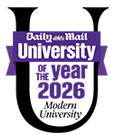Course overview
Hear from TU Online tutor Lisa about why you should study Aviation Management
Study 100% online at a time that suits your lifestyle.
You develop the resilience, agility and creativity to successfully navigate and lead a changed aviation sector. Explore areas including leadership, crisis management, and strategic decision making, equipping you with the knowledge and skills for a career in this reinvigorated industry.
Top reasons to study aviation management with us:
- Encounter problem-based research opportunities from leading aviation organisations.
- Network with aviation leaders at our annual conference.
- Access our Launchpad webinars: tap into a world of experience and expertise, from improving your leadership and management skills, to top tips for becoming a freelancer, Launchpad is here to help you start a business.
- Benefit from recognition by Airports Council International (ACI) and the Tourism Management Institute (TMI), allowing you to develop professional networks.
 You also benefit from our collaboration with Teesside International Airport who host field trips and guest lectures for our students to provide a rich and immersive learning experience.
You also benefit from our collaboration with Teesside International Airport who host field trips and guest lectures for our students to provide a rich and immersive learning experience.
 Airports Council International (ACI) Europe is committed to the pursuit of excellence in airport management through education and training. Our membership provides the benefits of ACI information, data and sustainability forecasting to our students.
Airports Council International (ACI) Europe is committed to the pursuit of excellence in airport management through education and training. Our membership provides the benefits of ACI information, data and sustainability forecasting to our students.
Course details
Course structure
Core modules
Agile Strategic Decision-Making in Aviation
Decision making is the cognitive process of selecting a course of action from multiple alternatives. The decision-making process produces a choice of action or an opinion that determines the decision maker's behaviour and therefore has a profound influence on task performance and multi-criteria problem-solving strategy in aviation. The factors affecting decision making from a business perspective to support an agile and sustainable aviation environment are analysed. These insights provide practical impactions to managers and offer effective decision outcomes characterised by goals, safety, operation costs and time constraints.
Challenges and Opportunities in the Skies
Aviation takes a pinnacle role in global connectivity, yet as an industry it is dynamic and subject to constant changes from external factors, presenting both opportunities and challenges. It is vital that those who work and lead in the sector appreciate the sensitivity of this industry and the need to exploit opportunities and respond innovatively to the challenges that present turbulence. You consider contemporary issues in the sector such as sustainability, digital disruption, global/political issues, innovation, technological advancement, and climate change/wider environmental issues.
You integrate your knowledge of theory and practice through its application to organisational issues. You are supported throughout the process by a supervising tutor who will monitor progress and ensure that you are appraised of your on-going performance. Usually the dissertation should be completed within one year.
The aviation industry has a history of natural and economic events that impact the smooth running of an airline or airport. It’s the resilience, experience and knowledge from people from within, that influence the future of the organisation and its recovery. Leaders within aviation embrace uncertainty and understand that this is the norm for the sector. They introduce robust strategic structures and ideas by creating an agile culture and openness to challenging external factors.
You explore emerging concepts such as thought leadership, and how effective implementation can shape organisations strategically in times of environmental change and rising levels of uncertainty. You consider your own skills, qualities and attributes to develop a professional action plan that can be utilised within a leadership role.
Passengers, Consumption and Culture
Management of non-core commercial activities has become a key issue for improving the airport experience for passengers. Changes in the modern air transport business have increasingly transformed the role of airports and the perception by consumers. With the expansion of low-cost carriers, raising competition between airlines, and advances in technology, consumer demands have changed dramatically. As a consequence, the search for revenue maximisation has gradually shifted its main focus from traditional core aeronautical service to non-aviation or commercial sources. You consider consumer culture and behaviour in the context of the ever-changing aviation sector. You explore key consumer behaviour dialogue and how it informs strategic marketing practice in the aviation industry.
Postgraduate Business Research Methods
This module develops your awareness and understanding of the factors that impact research design for business and management students. You explore the ethical principles underpinning business research, research methodologies, data type, collection and analysis, research methods and how to present a research proposal and dissertation.
The aviation industry is structurally different to many others, with intense competition and commoditisation. You develop an understanding of the complexities and challenges in transformational change and sector resilience. Through exploration of current global industry trends, you examine how aviation can transform businesses with a strategic focus on structural change, emerging technologies, and consumer behaviour.
Modules offered may vary.
How you learn
You learn through lectures, seminars, guest speakers, tutorials and workshops. Through online discussion and debates, you develop solutions to strategic challenges in aviation using real-world scenarios, creative dialogue, industry insights and field visits to grow as a leader. Use the latest technology to collaborate with international networks and airlines such as Emirates, Lufthansa and British Airways.
How you are assessed
Assessments are innovative and engaging, allowing you to develop sought after skills and qualities to work in this dynamic industry. You are assessed through business reports, case study analysis, presentations, self-diagnostic assessments, reflective reports, research proposal and dissertation.
Entry requirements
Typically an honours degree (at least a 2:2), professional qualification or equivalent experience.
For EU and international students an IELTS score (or equivalent) of 6.0.
For general information please see our overview of entry requirements
Employability
Career opportunities
You can expect to progress to a career in aviation consultancy or management operations.
Learning platform
Our virtual learning environment (VLE) is the platform you use to access your online course
Teesside University online learning courses are delivered through the Brightspace Learning Environment.
Here are some of the benefits.
- You can use it on your smartphone, tablet and computer.
- And you can use it anytime, so that you can plan your learning to fit your own schedule.
- It's easy to use and navigate.
- Modules are set out by topics and themes. You can use the progress bar to understand where you are in your modules, and appreciate your achievements.
- We support you to become familiar with your VLE, helping you to start learning quickly.
- You get feedback, help and guidance from tutors throughout your course through the VLE, and you can ask questions at any time.
- Our tutors use a live activity feed to keep you updated about your course.
- You can create a student profile, collaborate with other students and take part in online discussion forums.
.jpg)


 MSc Aviation Management (Online)
MSc Aviation Management (Online) MSc Aviation Management (Online)
MSc Aviation Management (Online)